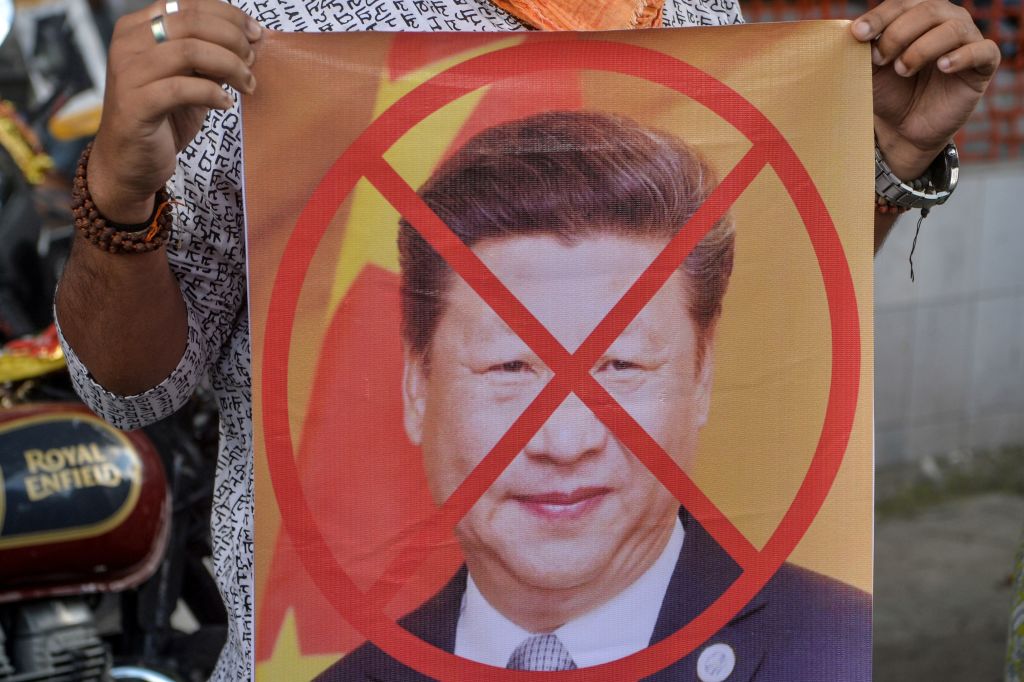China’s multi-pronged militarism against its neighbours in recent weeks is intended as a show of strength. In fact, it reveals a weakness at the top of Xi Jinping’s Communist party which could prove to be counterproductive.
Why is Xi lashing out? A detection of dissatisfaction among China’s people, mixed with a perceived opportunity for China to assert itself while the rest of the world is distracted by coronavirus, appears to have led to attacks against Indian troops and a crackdown in Hong Kong. But the gambit could backfire; and the country’s bid to attain superpower status might easily become a longer march than Xi is hoping for.
Xi has been compared more to the bristling Mao Zedong, the founder of the communist state, than the reformist Deng Xiaoping, who is generally credited with China’s meteoric rise as an economic power. He has massively tightened his grip on power by being president of the country, general secretary of the CPC and chairman of the Central Military Commission at the same time; and, with a new change of constitution, is now effectively also leader for life.
Xi, the first leader of China to be born after the establishment of the People’s Republic of China, also harbours Mao’s hostility towards the outside world. China has territorial disputes with several states around it. Indeed, its post-war camaraderie with communist Soviet Union evaporated to erupt in violent conflict in 1969, with the Russians using tanks and rockets to inflict heavy casualties on the Chinese. According to the CIA, Mao backed down because he didn’t want China’s fledgling nuclear capability to be annihilated by a Soviet assault.
The tussle with Japan and Vietnam and over the South China Sea, though, remained. While the disagreement with Delhi, ostensibly thrust into the back-burner in 1993, has evolved into an attempt to encircle India by deepening ties with countries around it, including Sri Lanka and Nepal (where a communist party is in government). Forging closer ties to India’s perennial adversary Pakistan – with its burgeoning money power – is also a key part of this strategy.
But an evolving quadrilateral alliance between the US, Japan (which has re-asserted its claim over the Senkaku islands in the East China Sea), India and Australia, with moral support from a majority of the ten-member Association of South-East Asian Nations (ASEAN), could soon put paid to this approach.
What’s more, the repeated spread of deadly viruses from China in the past 20 years – and the global havoc Covid-19 has inflicted (with China remaining stubbornly unapologetic) – has provoked North America, Europe, Japan and India to explore substitutes to imports from China, either indigenously or from alternative sources. Some Western and Japanese multinational corporations are also considering relocating their manufacturing bases from the Chinese mainland.
China’s enactment of new national security legislation for Hong Kong in violation of its ‘one country, two systems’ pledge to Britain is also not going unnoticed. In the US, it has been met with new visa restrictions on the Chinese officials responsible. This is part of a process to terminate the special economic treatment granted to the peninsula, which enabled it to remain a financial powerhouse even after the United Kingdom handed it over to China in 1997.
Meanwhile, elements in the CPC have vowed to capture Taiwan to celebrate the centenary of the party’s formation next year. The US has treaty obligations to this symbol of resistance to Chinese communism to defend it from such aggression. And already US warships have intensified patrolling in the South China Sea.
What China – and Xi – must realise is that as an emerging economy, it cannot by definition be described as a superpower. Besides, while the country’s military spending is next only to the US, the sophistication of its weaponry is not in the league of America, countries in western Europe or Russia. And the number of its nuclear warheads is still fairly modest compared to that of the US and Russia. As a result, a combination of a steady strangulation of Chinese exports – all important to China’s economy – and a military checkmate would gradually pinch its reserves as well as necessitate a diversion of resources from development to defence. The domino effect of this could be a slower GDP growth and a likely deceleration in its surge to become a superpower. Xi must tread carefully.
Ashis Ray is a former South Asia bureau chief of CNN






Comments